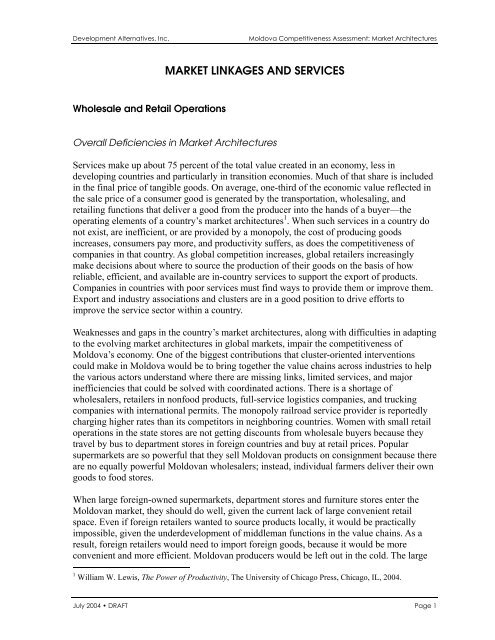Assessing Competitiveness In Moldova's Economy - Economic Growth
Assessing Competitiveness In Moldova's Economy - Economic Growth
Assessing Competitiveness In Moldova's Economy - Economic Growth
Create successful ePaper yourself
Turn your PDF publications into a flip-book with our unique Google optimized e-Paper software.
Development Alternatives, <strong>In</strong>c. Moldova <strong>Competitiveness</strong> Assessment: Market Architectures<br />
Wholesale and Retail Operations<br />
MARKET LINKAGES AND SERVICES<br />
Overall Deficiencies in Market Architectures<br />
Services make up about 75 percent of the total value created in an economy, less in<br />
developing countries and particularly in transition economies. Much of that share is included<br />
in the final price of tangible goods. On average, one-third of the economic value reflected in<br />
the sale price of a consumer good is generated by the transportation, wholesaling, and<br />
retailing functions that deliver a good from the producer into the hands of a buyer—the<br />
operating elements of a country’s market architectures 1 . When such services in a country do<br />
not exist, are inefficient, or are provided by a monopoly, the cost of producing goods<br />
increases, consumers pay more, and productivity suffers, as does the competitiveness of<br />
companies in that country. As global competition increases, global retailers increasingly<br />
make decisions about where to source the production of their goods on the basis of how<br />
reliable, efficient, and available are in-country services to support the export of products.<br />
Companies in countries with poor services must find ways to provide them or improve them.<br />
Export and industry associations and clusters are in a good position to drive efforts to<br />
improve the service sector within a country.<br />
Weaknesses and gaps in the country’s market architectures, along with difficulties in adapting<br />
to the evolving market architectures in global markets, impair the competitiveness of<br />
Moldova’s economy. One of the biggest contributions that cluster-oriented interventions<br />
could make in Moldova would be to bring together the value chains across industries to help<br />
the various actors understand where there are missing links, limited services, and major<br />
inefficiencies that could be solved with coordinated actions. There is a shortage of<br />
wholesalers, retailers in nonfood products, full-service logistics companies, and trucking<br />
companies with international permits. The monopoly railroad service provider is reportedly<br />
charging higher rates than its competitors in neighboring countries. Women with small retail<br />
operations in the state stores are not getting discounts from wholesale buyers because they<br />
travel by bus to department stores in foreign countries and buy at retail prices. Popular<br />
supermarkets are so powerful that they sell Moldovan products on consignment because there<br />
are no equally powerful Moldovan wholesalers; instead, individual farmers deliver their own<br />
goods to food stores.<br />
When large foreign-owned supermarkets, department stores and furniture stores enter the<br />
Moldovan market, they should do well, given the current lack of large convenient retail<br />
space. Even if foreign retailers wanted to source products locally, it would be practically<br />
impossible, given the underdevelopment of middleman functions in the value chains. As a<br />
result, foreign retailers would need to import foreign goods, because it would be more<br />
convenient and more efficient. Moldovan producers would be left out in the cold. The large<br />
1 William W. Lewis, The Power of Productivity, The University of Chicago Press, Chicago, IL, 2004.<br />
July 2004 • DRAFT Page 1
















